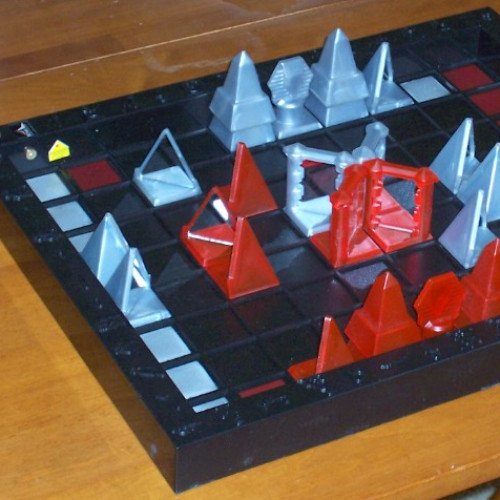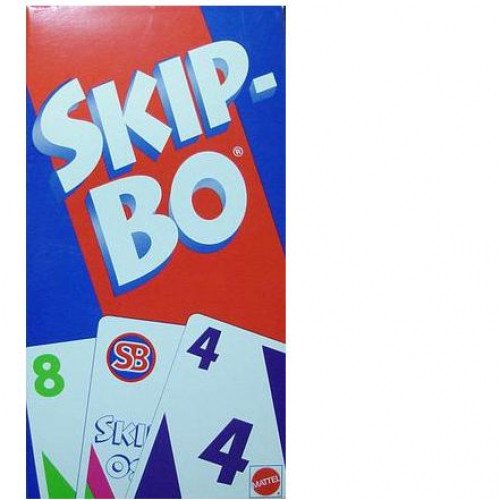KHET VS SKIP-BO

KHET
Khet is a chess-like abstract strategy board game using lasers that was formerly known as Deflexion. Players take turns moving Egyptian-themed pieces around the playing field, firing their low-powered laser diode after each move. Most of the pieces are mirrored on one or more sides, allowing the players to alter the path of the laser through the playing field. When a piece is struck by a laser on a non-mirrored side, it is eliminated from the game. Under its original name, the game was a Mensa Select Award winner. Its name was changed on September 15, 2006. The new game retains the same rules of gameplay, but has a different design, including a new color scheme and a new box design. Under the new name, the game was one of five finalists for the 2007 Toy of the Year award. Professor Michael Larson and two students, Del Segura and Luke Hooper, designed the game as a class project at Tulane University. (Professor Larson is now at the University of Colorado.) The game was introduced to the public in the spring of 2005, and was first brought to prominence at the New York Toy Fair of that year. The game was first shipped in October 2005. The first Deflexion World Championship was held December 10, 2005 under the dome at the Massachusetts Institute of Technology. Registration was free, and the participants competed for cash and other prizes. The winner was an MIT student. Under the new name, Khet, the first Regional Championship took place in April 2006 at the famous Café du Monde in the New Orleans French Quarter. Twenty-four participants competed for a number of prizes. As a special bonus, the Eye of Horus beam splitter was unveiled at the very end, and used by each player in the championship game. Khet was also featured on a recent episode of the HGTV show "I Want That: Tech Toys". Footage from the New Orleans tournament was included in the broadcast. In 2017 a company called "Thinkfun" acquired the license for the now out of print Khet 2.0 and rebranded the game "Laser Chess". Now with a new, modernized scifi look, it brings the exact same rules and feel of Khet 2.0 back to the table.
Statistics for this Xoptio

SKIP-BO
Skip-Bo is a commercial version of the card game Spite and Malice, a derivative of Russian Bank (also known as Crapette or Tunj). In 1967, Minnie Hazel "Skip" Bowman (1915–2001) of Brownfield, Texas, began producing a boxed edition of the game under the name SKIP-BO. In 1980 the game was purchased by International Games, which was subsequently bought by Mattel in 1992. A mobile version of the game for iOS was released by Magmic in September, 2013. There is a new version called "SKIP-BO Mod" that comes in a white and blue case. Two to four people can play at a time as individuals, or, six or more players in teams (no more than three partnerships). The object of the game is to be the first player or team to play out their entire stock pile(s). The player with the middle age goes first. Each player is dealt 30 cards (recommended 10-15 for faster gameplay) for their pile with only the top card visible, and a hand of five cards, and the remaining cards are placed face down to create a common draw pile. The shared play area allows up to four build piles, which must be started using either a "1" card or a Skip-Bo, and each player also has up to four personal discard piles. Each turn the active player draws until they have five cards in hand, though there are cases of not drawing more cards to equal five cards, instead doing a draw of a certain number of cards. They must play either the next card in sequential order or a wild Skip-Bo card, using either cards in hand, the top card of their stock pile, or the top card of any of their four discard piles. If the player can play all five cards from their hand, they draw five more and continue playing. When no more plays are available, the player discards one card to either an empty discard pile or on top of an existing one and play passes to the next player. When a build pile reaches 12, it is removed from the board and that space becomes empty for another pile to be started; play continues until one player has played their final start card.